虚拟语气
图片预览
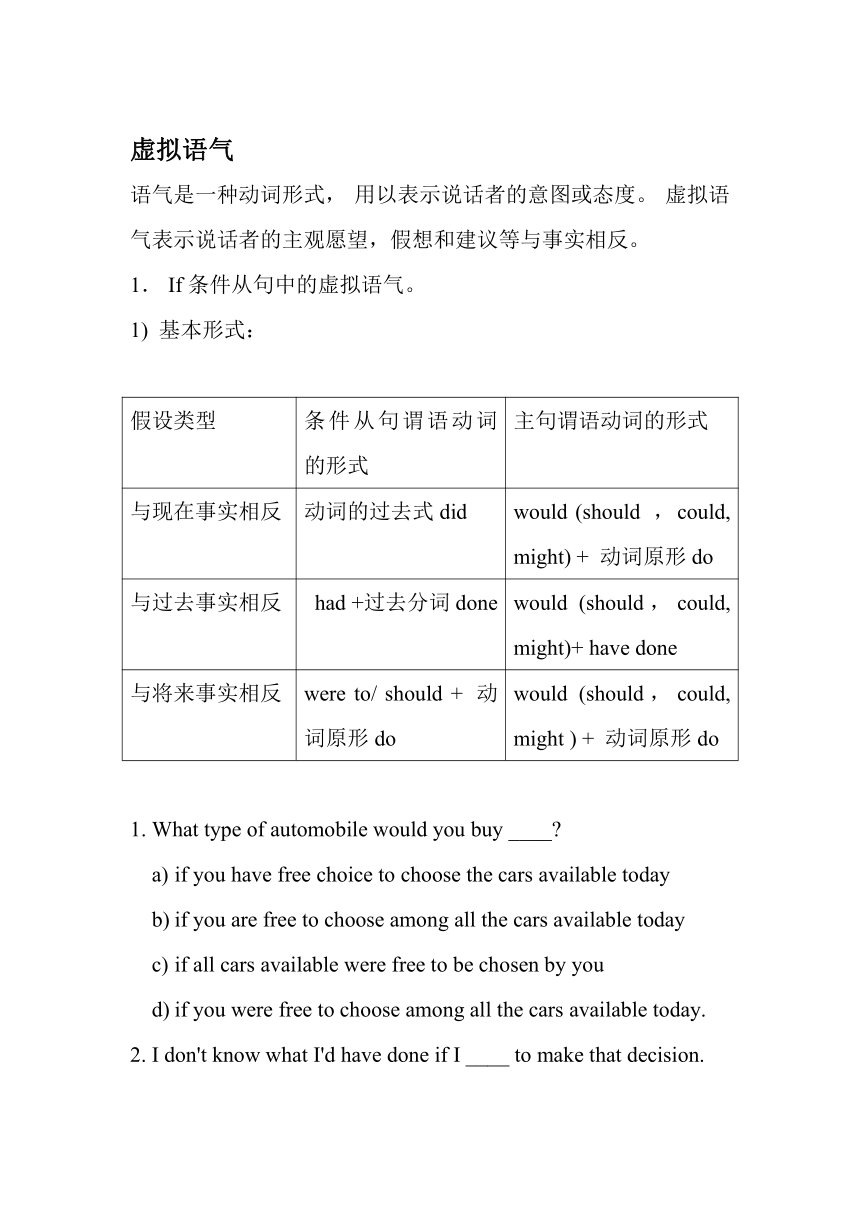
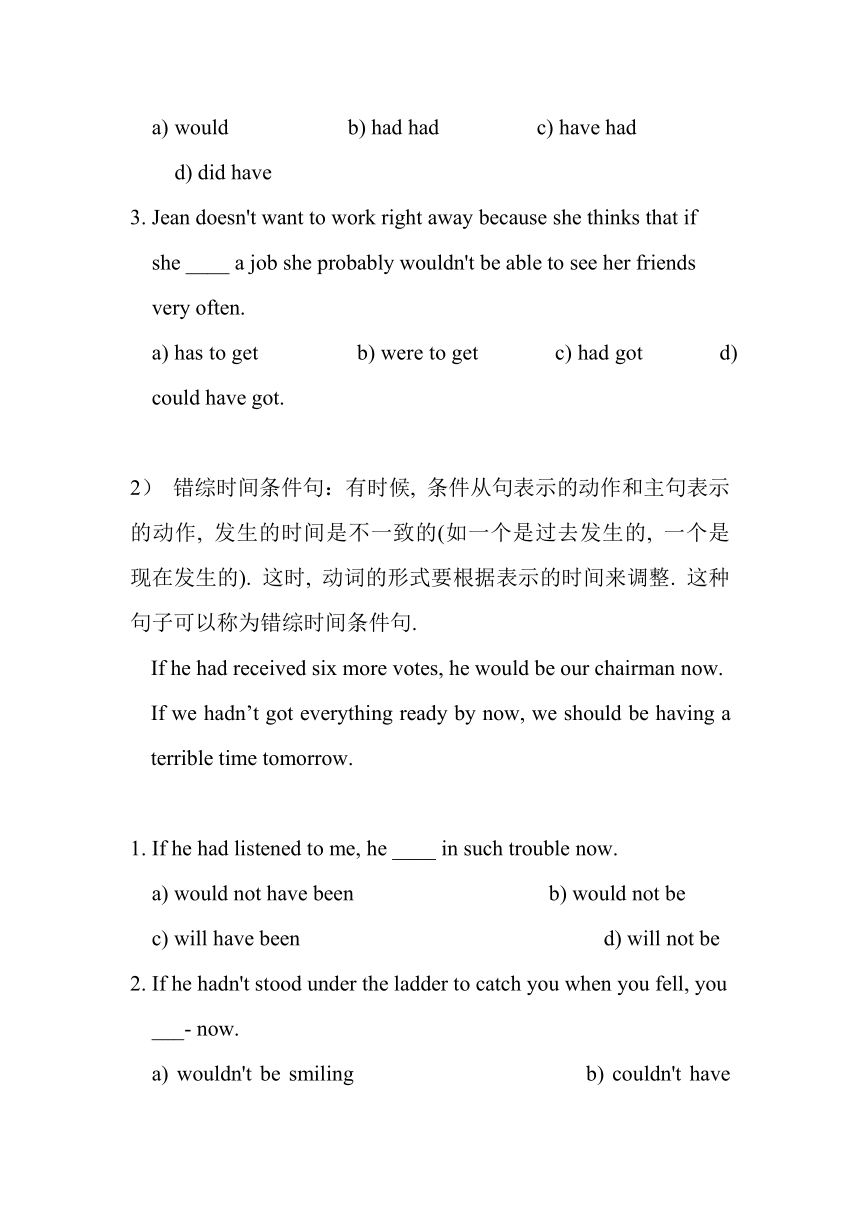
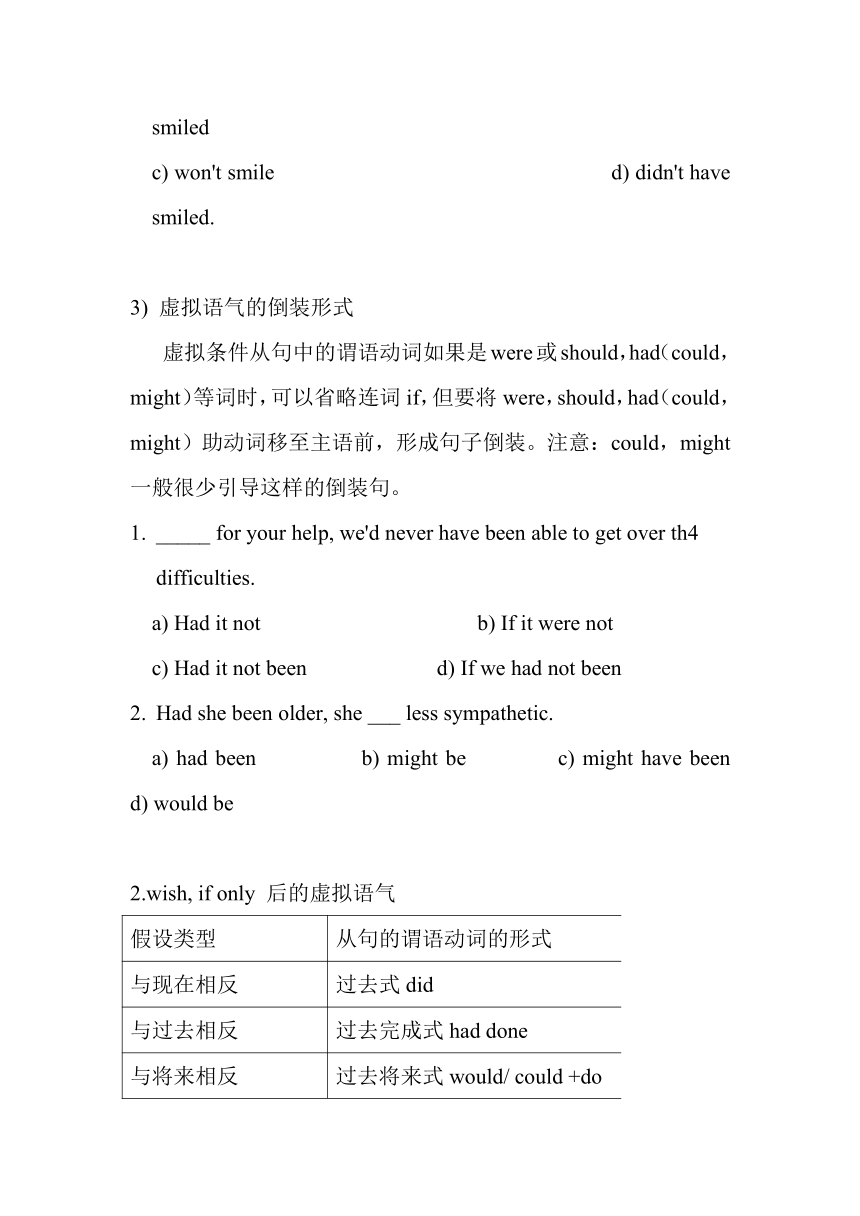
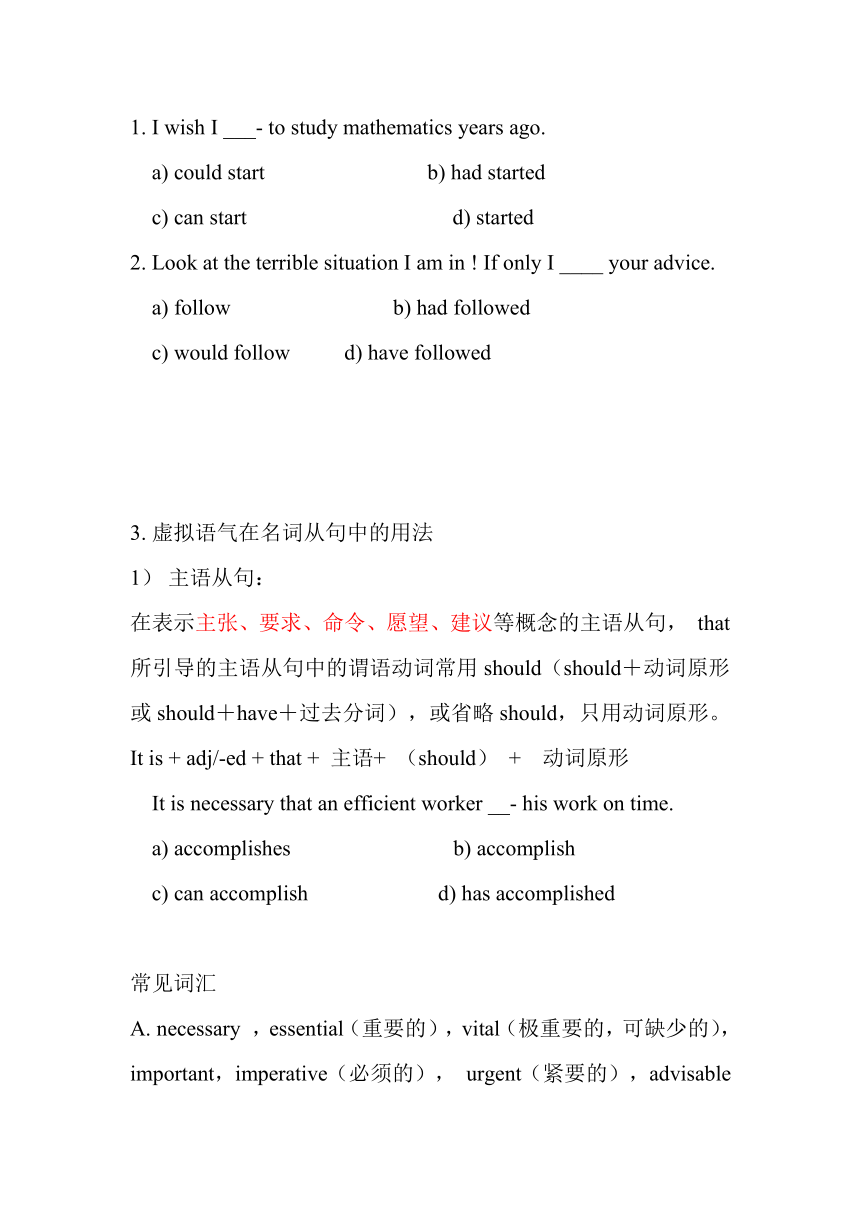
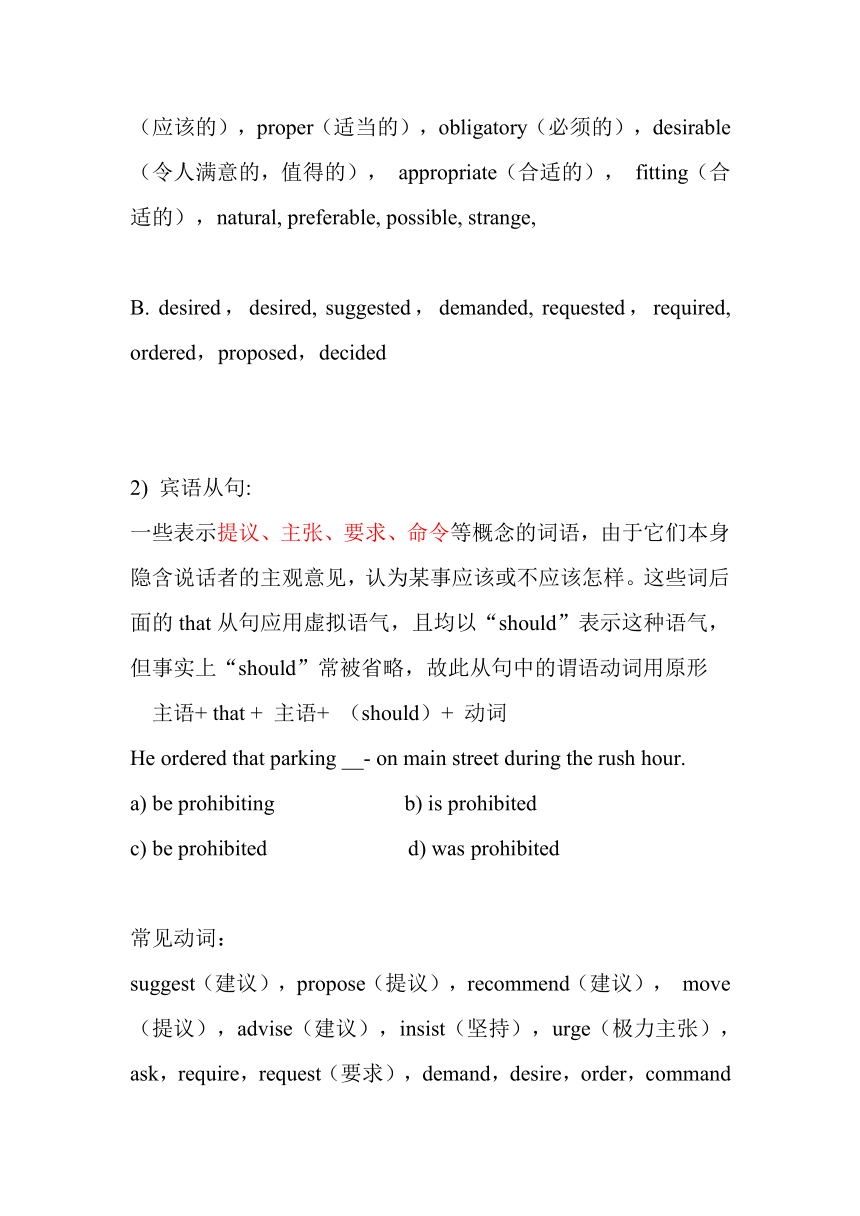
文档简介
虚拟语气
语气是一种动词形式, 用以表示说话者的意图或态度。 虚拟语气表示说话者的主观愿望,假想和建议等与事实相反。
If条件从句中的虚拟语气。
1) 基本形式:
假设类型 条件从句谓语动词的形式 主句谓语动词的形式
与现在事实相反 动词的过去式did would (should ,could, might) + 动词原形do
与过去事实相反 had +过去分词done would (should,could, might)+ have done
与将来事实相反 were to/ should + 动词原形do would (should,could, might ) + 动词原形do
What type of automobile would you buy ____
if you have free choice to choose the cars available today
if you are free to choose among all the cars available today
if all cars available were free to be chosen by you
if you were free to choose among all the cars available today.
I don't know what I'd have done if I ____ to make that decision.
would b) had had c) have had d) did have
Jean doesn't want to work right away because she thinks that if she ____ a job she probably wouldn't be able to see her friends very often.
a) has to get b) were to get c) had got d) could have got.
2) 错综时间条件句:有时候, 条件从句表示的动作和主句表示的动作, 发生的时间是不一致的(如一个是过去发生的, 一个是现在发生的). 这时, 动词的形式要根据表示的时间来调整. 这种句子可以称为错综时间条件句.
If he had received six more votes, he would be our chairman now.
If we hadn’t got everything ready by now, we should be having a terrible time tomorrow.
If he had listened to me, he ____ in such trouble now.
a) would not have been b) would not be
c) will have been d) will not be
If he hadn't stood under the ladder to catch you when you fell, you ___- now.
a) wouldn't be smiling b) couldn't have smiled
c) won't smile d) didn't have smiled.
3) 虚拟语气的倒装形式
虚拟条件从句中的谓语动词如果是were或should,had(could,might)等词时,可以省略连词if,但要将were,should,had(could,might)助动词移至主语前,形成句子倒装。注意:could,might一般很少引导这样的倒装句。
_____ for your help, we'd never have been able to get over th4 difficulties.
a) Had it not b) If it were not
c) Had it not been d) If we had not been
Had she been older, she ___ less sympathetic.
a) had been b) might be c) might have been d) would be
2.wish, if only 后的虚拟语气
假设类型 从句的谓语动词的形式
与现在相反 过去式did
与过去相反 过去完成式had done
与将来相反 过去将来式would/ could +do
I wish I ___- to study mathematics years ago.
a) could start b) had started
c) can start d) started
Look at the terrible situation I am in ! If only I ____ your advice.
a) follow b) had followed
c) would follow d) have followed
虚拟语气在名词从句中的用法
主语从句:
在表示主张、要求、命令、愿望、建议等概念的主语从句, that所引导的主语从句中的谓语动词常用should(should+动词原形或should+have+过去分词),或省略should,只用动词原形。
It is + adj/-ed + that + 主语+ (should) + 动词原形
It is necessary that an efficient worker __- his work on time.
a) accomplishes b) accomplish
c) can accomplish d) has accomplished
常见词汇
A. necessary ,essential(重要的),vital(极重要的,可缺少的),important,imperative(必须的), urgent(紧要的),advisable(应该的),proper(适当的),obligatory(必须的),desirable(令人满意的,值得的), appropriate(合适的), fitting(合适的),natural, preferable, possible, strange,
B. desired,desired, suggested,demanded, requested,required, ordered,proposed,decided
2) 宾语从句:
一些表示提议、主张、要求、命令等概念的词语,由于它们本身隐含说话者的主观意见,认为某事应该或不应该怎样。这些词后面的that从句应用虚拟语气,且均以“should”表示这种语气,但事实上“should”常被省略,故此从句中的谓语动词用原形
主语+ that + 主语+ (should)+ 动词
He ordered that parking __- on main street during the rush hour.
a) be prohibiting b) is prohibited
c) be prohibited d) was prohibited
常见动词:
suggest(建议),propose(提议),recommend(建议), move(提议),advise(建议),insist(坚持),urge(极力主张),ask,require,request(要求),demand,desire,order,command(命令),decide,intend(打算),prefer(宁愿), determine等
3) 表语从句和同位语从句:
下列表示主张、要求、命令等概念的名词后面的“that”引导的同位语从句,这种由that引导的从句其谓语动词通常用should+动词原形或省略should。
The mother rejected my suggestion that she ____ her daughter the next week.
a) met b) would meet c) meets d) meet
My suggestion is that we _-- at once.
a) started out b) start out c) would start out d) to start out
这类词有:advice, order,request,insistence,suggestion, command,necessity,importance,idea,plan,motion(提议),proposal(建议),demand, desire, urge, preference, requirement
recommendation(建议), instructions(命令,指示),understanding (协议),resolution(决定,决议)等。
四、含蓄条件句
非真实条件句中的条件从句有时不表出来,只暗含在上下文中,这种句子叫做含蓄条件句。含蓄条件句大体有三种情况;
1. 条件暗含在短语中。如:
(1)、What would I have done without you 如没有你,我会怎么办呢?(条件暗含在分词短语without you中)
(2) 、It would be easier to do it this way. 这样做会比较容易。(条件暗含在不定式短语to do it this way中)
(3) 、This same thing, happening in wartime, would lead to a disaster. 同样的事,如发生在战时,就会酿成大祸。(条件暗含在分词短语happening in wartime中)
(4)、 But for your help we couldn’t have succeeded in the experiment. 如果没有你的帮助,我们的实验是不会成功。(暗含条件是but for your help)
(5)、 He must have the strength of a hippopotamus, or he never could have vanquished that great beast. 他一定是力大如河马,否则他绝不会击败那只庞大的野兽。(暗含条件是连词or)
(6)、 Alone, he would have been terrified. 如是单独一人,他是会感到害怕的。(暗含条件是alone)
2. 条件暗含在上下文中。如:
(7)、 You might stay her forever. 你可以永远待在这儿。(可能暗含if you wanted to) (8) 、We would have succeeded. 我们本来是会成功的。(可能暗含if we had kept trying) (9) 、Your reputation would be ruined. 你的名誉会败坏的。(可能暗含if you should accept it)
(10) 、I would appreciate a little of your time. 谢谢你给我一点时间吧。(可能暗含if you were so kind as to give me a little of your time)
3. 在不少情况下,虚拟式已变成习惯说法,很难找出其暗含的条件。如:
(11) 、You wouldn’t know. 你不会知道。
(12) 、I would like to come. 我愿意来。
(13) 、I wouldn’t have dreamed of it. 这是我做梦也不会想到的。
(14) 、He told the story in such minute detail that he might himself have been an eye-witness. 他将那事讲的非常仔细,简直就象他亲眼看见一样。
五.其他用法
it is (about, high) time + did
He is already 40, and it's about time he __- himself a wife and settled down.
a) finds b) found c) should find d) had found
would/had rather, would sooner, would prefer (that ) + did
I'd rather you ____ anything about it for the time being.
a) do b) don't c) didn't do d) didn't
as if/as though 引导的让步状语从句的形式与wish相同
She loves the children in the kindergarten as if they __- her own.
a) are b) were c) has been d) be
注意:as if和as though引导的从句不一定非用虚拟语气,要视假设的语气强弱而定。尤其是在表示感觉的系动词后,如:look,seem,appear,sound,feel,smell,taste等,既可用虚拟,也可用直陈,且用直陈语气居多。
lest , for fear that, in case +( should) + 动词原形
The mad man was put in the soft-padded cell lest he ___- himself.
a) injure b) had injured c) injured d) would injure
Take your raincoat in case it should rain.虚拟语气
Take your raincoat in case it rains. 陈述语气
5)介词短语等其他方式表示虚拟。
有时假设的情况并不以条件从句表示出来,而是通过一个介词短语来表示,或通过上下文和其他方式表示出来。如 but for,without等表示让步假设。它们引导的虚拟语气的形式与条件主句相同。
Without music, the world would be a dull place.
But for the storm, we should have arrived earlier.
6) If it were not for或were it not for这种说法说明为什么某事已经发生或没有发生。用 If it had not been for或Had it not been for解释某事为什么在过去没有发生。以上的说法可以译为“要不是…”。
Were it not for their assistance, we would be in serious difficulty.
whatever, whoever, no matter what这类代词或词组引起的从句(这时, 谓语多用may加动词原形构成):
Whatever defects he may have, he is an honest man.
Come what may, we will go ahead. 不管发生什么情况, 我们都要干下去.
I accept that he is old and frail; be that as it may, he’s still a good politician.
我承认他年老体衰, 然而尽管如此, 它仍是优秀的政治家.
语气是一种动词形式, 用以表示说话者的意图或态度。 虚拟语气表示说话者的主观愿望,假想和建议等与事实相反。
If条件从句中的虚拟语气。
1) 基本形式:
假设类型 条件从句谓语动词的形式 主句谓语动词的形式
与现在事实相反 动词的过去式did would (should ,could, might) + 动词原形do
与过去事实相反 had +过去分词done would (should,could, might)+ have done
与将来事实相反 were to/ should + 动词原形do would (should,could, might ) + 动词原形do
What type of automobile would you buy ____
if you have free choice to choose the cars available today
if you are free to choose among all the cars available today
if all cars available were free to be chosen by you
if you were free to choose among all the cars available today.
I don't know what I'd have done if I ____ to make that decision.
would b) had had c) have had d) did have
Jean doesn't want to work right away because she thinks that if she ____ a job she probably wouldn't be able to see her friends very often.
a) has to get b) were to get c) had got d) could have got.
2) 错综时间条件句:有时候, 条件从句表示的动作和主句表示的动作, 发生的时间是不一致的(如一个是过去发生的, 一个是现在发生的). 这时, 动词的形式要根据表示的时间来调整. 这种句子可以称为错综时间条件句.
If he had received six more votes, he would be our chairman now.
If we hadn’t got everything ready by now, we should be having a terrible time tomorrow.
If he had listened to me, he ____ in such trouble now.
a) would not have been b) would not be
c) will have been d) will not be
If he hadn't stood under the ladder to catch you when you fell, you ___- now.
a) wouldn't be smiling b) couldn't have smiled
c) won't smile d) didn't have smiled.
3) 虚拟语气的倒装形式
虚拟条件从句中的谓语动词如果是were或should,had(could,might)等词时,可以省略连词if,但要将were,should,had(could,might)助动词移至主语前,形成句子倒装。注意:could,might一般很少引导这样的倒装句。
_____ for your help, we'd never have been able to get over th4 difficulties.
a) Had it not b) If it were not
c) Had it not been d) If we had not been
Had she been older, she ___ less sympathetic.
a) had been b) might be c) might have been d) would be
2.wish, if only 后的虚拟语气
假设类型 从句的谓语动词的形式
与现在相反 过去式did
与过去相反 过去完成式had done
与将来相反 过去将来式would/ could +do
I wish I ___- to study mathematics years ago.
a) could start b) had started
c) can start d) started
Look at the terrible situation I am in ! If only I ____ your advice.
a) follow b) had followed
c) would follow d) have followed
虚拟语气在名词从句中的用法
主语从句:
在表示主张、要求、命令、愿望、建议等概念的主语从句, that所引导的主语从句中的谓语动词常用should(should+动词原形或should+have+过去分词),或省略should,只用动词原形。
It is + adj/-ed + that + 主语+ (should) + 动词原形
It is necessary that an efficient worker __- his work on time.
a) accomplishes b) accomplish
c) can accomplish d) has accomplished
常见词汇
A. necessary ,essential(重要的),vital(极重要的,可缺少的),important,imperative(必须的), urgent(紧要的),advisable(应该的),proper(适当的),obligatory(必须的),desirable(令人满意的,值得的), appropriate(合适的), fitting(合适的),natural, preferable, possible, strange,
B. desired,desired, suggested,demanded, requested,required, ordered,proposed,decided
2) 宾语从句:
一些表示提议、主张、要求、命令等概念的词语,由于它们本身隐含说话者的主观意见,认为某事应该或不应该怎样。这些词后面的that从句应用虚拟语气,且均以“should”表示这种语气,但事实上“should”常被省略,故此从句中的谓语动词用原形
主语+ that + 主语+ (should)+ 动词
He ordered that parking __- on main street during the rush hour.
a) be prohibiting b) is prohibited
c) be prohibited d) was prohibited
常见动词:
suggest(建议),propose(提议),recommend(建议), move(提议),advise(建议),insist(坚持),urge(极力主张),ask,require,request(要求),demand,desire,order,command(命令),decide,intend(打算),prefer(宁愿), determine等
3) 表语从句和同位语从句:
下列表示主张、要求、命令等概念的名词后面的“that”引导的同位语从句,这种由that引导的从句其谓语动词通常用should+动词原形或省略should。
The mother rejected my suggestion that she ____ her daughter the next week.
a) met b) would meet c) meets d) meet
My suggestion is that we _-- at once.
a) started out b) start out c) would start out d) to start out
这类词有:advice, order,request,insistence,suggestion, command,necessity,importance,idea,plan,motion(提议),proposal(建议),demand, desire, urge, preference, requirement
recommendation(建议), instructions(命令,指示),understanding (协议),resolution(决定,决议)等。
四、含蓄条件句
非真实条件句中的条件从句有时不表出来,只暗含在上下文中,这种句子叫做含蓄条件句。含蓄条件句大体有三种情况;
1. 条件暗含在短语中。如:
(1)、What would I have done without you 如没有你,我会怎么办呢?(条件暗含在分词短语without you中)
(2) 、It would be easier to do it this way. 这样做会比较容易。(条件暗含在不定式短语to do it this way中)
(3) 、This same thing, happening in wartime, would lead to a disaster. 同样的事,如发生在战时,就会酿成大祸。(条件暗含在分词短语happening in wartime中)
(4)、 But for your help we couldn’t have succeeded in the experiment. 如果没有你的帮助,我们的实验是不会成功。(暗含条件是but for your help)
(5)、 He must have the strength of a hippopotamus, or he never could have vanquished that great beast. 他一定是力大如河马,否则他绝不会击败那只庞大的野兽。(暗含条件是连词or)
(6)、 Alone, he would have been terrified. 如是单独一人,他是会感到害怕的。(暗含条件是alone)
2. 条件暗含在上下文中。如:
(7)、 You might stay her forever. 你可以永远待在这儿。(可能暗含if you wanted to) (8) 、We would have succeeded. 我们本来是会成功的。(可能暗含if we had kept trying) (9) 、Your reputation would be ruined. 你的名誉会败坏的。(可能暗含if you should accept it)
(10) 、I would appreciate a little of your time. 谢谢你给我一点时间吧。(可能暗含if you were so kind as to give me a little of your time)
3. 在不少情况下,虚拟式已变成习惯说法,很难找出其暗含的条件。如:
(11) 、You wouldn’t know. 你不会知道。
(12) 、I would like to come. 我愿意来。
(13) 、I wouldn’t have dreamed of it. 这是我做梦也不会想到的。
(14) 、He told the story in such minute detail that he might himself have been an eye-witness. 他将那事讲的非常仔细,简直就象他亲眼看见一样。
五.其他用法
it is (about, high) time + did
He is already 40, and it's about time he __- himself a wife and settled down.
a) finds b) found c) should find d) had found
would/had rather, would sooner, would prefer (that ) + did
I'd rather you ____ anything about it for the time being.
a) do b) don't c) didn't do d) didn't
as if/as though 引导的让步状语从句的形式与wish相同
She loves the children in the kindergarten as if they __- her own.
a) are b) were c) has been d) be
注意:as if和as though引导的从句不一定非用虚拟语气,要视假设的语气强弱而定。尤其是在表示感觉的系动词后,如:look,seem,appear,sound,feel,smell,taste等,既可用虚拟,也可用直陈,且用直陈语气居多。
lest , for fear that, in case +( should) + 动词原形
The mad man was put in the soft-padded cell lest he ___- himself.
a) injure b) had injured c) injured d) would injure
Take your raincoat in case it should rain.虚拟语气
Take your raincoat in case it rains. 陈述语气
5)介词短语等其他方式表示虚拟。
有时假设的情况并不以条件从句表示出来,而是通过一个介词短语来表示,或通过上下文和其他方式表示出来。如 but for,without等表示让步假设。它们引导的虚拟语气的形式与条件主句相同。
Without music, the world would be a dull place.
But for the storm, we should have arrived earlier.
6) If it were not for或were it not for这种说法说明为什么某事已经发生或没有发生。用 If it had not been for或Had it not been for解释某事为什么在过去没有发生。以上的说法可以译为“要不是…”。
Were it not for their assistance, we would be in serious difficulty.
whatever, whoever, no matter what这类代词或词组引起的从句(这时, 谓语多用may加动词原形构成):
Whatever defects he may have, he is an honest man.
Come what may, we will go ahead. 不管发生什么情况, 我们都要干下去.
I accept that he is old and frail; be that as it may, he’s still a good politician.
我承认他年老体衰, 然而尽管如此, 它仍是优秀的政治家.
